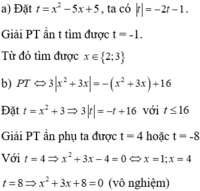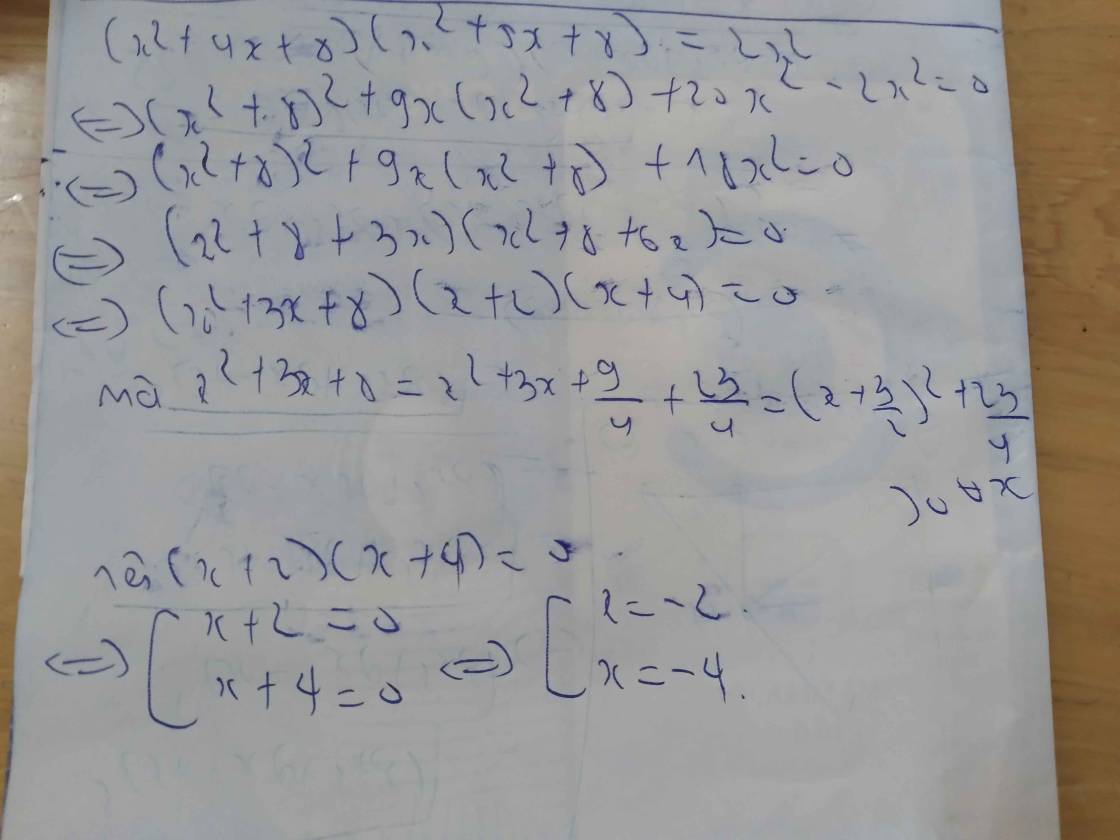Giải phương trình 2x2+√x2-5x+6=10x-9
Hãy nhập câu hỏi của bạn vào đây, nếu là tài khoản VIP, bạn sẽ được ưu tiên trả lời.


Bài 2:
a: =>2x^2-4x+1=x^2+x+5
=>x^2-5x-4=0
=>\(x=\dfrac{5\pm\sqrt{41}}{2}\)
b: =>11x^2-14x-12=3x^2+4x-7
=>8x^2-18x-5=0
=>x=5/2 hoặc x=-1/4

2\(x^2\) - 5 \(\sqrt{x^2-5x+7}\) = 10\(x\) - 17 Đk \(x^2\) - 5\(x\) + 7 ≥ 0
\(x^2\) - 2.\(\dfrac{5}{2}\)\(x\) + \(\dfrac{25}{4}\) + \(\dfrac{3}{4}\) = (\(x\) - \(\dfrac{5}{2}\))2 + \(\dfrac{3}{4}\) > 0 ∀ \(x\)
ta có: 2\(x^2\) - 5\(\sqrt{x^2-5x+7}\) = 10\(x\) - 17
2\(x^2\) - 5\(\sqrt{x^2-5x+7}\) - 10\(x\) + 17 = 0
(2\(x^2\) - 10\(x\) + 14) - 5\(\sqrt{x^2-5x+7}\) + 3 = 0
2.(\(x^2\) - 5\(x\) + 7) - 5.\(\sqrt{x^2-5x+7}\) + 3 = 0
Đặt \(\sqrt{x^2-5x+7}\) = y > 0 ta có:
2y2 - 5y + 3 = 0
2 + (-5) + 3 = 0
⇒ y1= 1; y2 = \(\dfrac{3}{2}\)
TH1 y = 1 ⇒ \(\sqrt{x^2-5x+7}\) = 1
⇒ \(x^2\) - 5\(x\) + 7 = 1
\(x^2\) - 5\(x\) + 6 = 0
\(\Delta\) = 25 - 24 = 49
\(x_1\) = \(\dfrac{-\left(-5\right)+\sqrt{1}}{2}\) = 3;
\(x_2\) = \(\dfrac{-\left(-5\right)-\sqrt{1}}{2}\) = 2;
TH2 y = \(\dfrac{3}{2}\)
\(\sqrt{x^2-5x+7}\) = \(\dfrac{3}{2}\)
\(x^2\) - 5\(x\) + 7 = \(\dfrac{9}{4}\)
4\(x^2\) - 20\(x\) + 28 = 9
4\(x^2\) - 20\(x\) + 19 = 0
\(\Delta'\) = 102 - 4.19
\(\Delta'\) = 24
\(x_1\) = \(\dfrac{-\left(-10\right)+\sqrt{24}}{4}\) = \(\dfrac{10+\sqrt{24}}{4}\)
\(x_2\) = \(\dfrac{-\left(-10\right)-\sqrt{24}}{4}\) = \(\dfrac{10-\sqrt{24}}{4}\)
8 - 5\(\sqrt{6}\)
Từ các lập luận trên kết luận phương trình có tập nghiệm là:
S = {8 - 5\(\sqrt{6}\); 2 ; 3; 8 + 5\(\sqrt{6}\)}
2�2x2 - 5 �2−5�+7x2−5x+7 = 10�x - 17 Đk �2x2 - 5�x + 7 ≥ 0
�2x2 - 2.5225�x + 254425 + 3443 = (�x - 5225)2 + 3443 > 0 ∀ �x
ta có: 2�2x2 - 5�2−5�+7x2−5x+7 = 10�x - 17
2�2x2 - 5�2−5�+7x2−5x+7 - 10�x + 17 = 0
(2�2x2 - 10�x + 14) - 5�2−5�+7x2−5x+7 + 3 = 0
2.(�2x2 - 5�x + 7) - 5.�2−5�+7x2−5x+7 + 3 = 0
Đặt �2−5�+7x2−5x+7 = y > 0 ta có:
2y2 - 5y + 3 = 0
2 + (-5) + 3 = 0
⇒ y1= 1; y2 = 3223
TH1 y = 1 ⇒ �2−5�+7x2−5x+7 = 1
⇒ �2x2 - 5�x + 7 = 1
�2x2 - 5�x + 6 = 0
ΔΔ = 25 - 24 = 49
�1x1 = −(−5)+122−(−5)+1 = 3;
�2x2 = −(−5)−122−(−5)−1 = 2;
TH2 y = 3223
�2−5�+7x2−5x+7 = 3223
�2x2 - 5�x + 7 = 9449
4�2x2 - 20�x + 28 = 9
4�2x2 - 20�x + 19 = 0
Δ′Δ′ = 102 - 4.19
Δ′Δ′ = 24
�1x1 = −(−10)+2444−(−10)+24 = 10+244410+24
�2x2 = −(−10)−2444−(−10)−24 = 10−244410−24
8 - 566
Từ các lập luận trên kết luận phương trình có tập nghiệm là:
S = {8 - 566; 2 ; 3; 8 + 566}

Phương trình đã cho tương đương:

Phương trình (1) trở thành: 2 t + 4 - a = t 2
Phương trình (2) ⇔ t ≥ 0 t = 2 a − 8 t = 2 a − 8 3 để phương trình (1) có 4 nghiệm phân biệt thì điều kiện cần là (2) phải có 2 nghiệm phân biệt, tức là 2 a − 8 > 0 ⇔ a > 4 *
Khi đó, thay lại ta có: x 2 − 5 x + a = 2 a − 8 3 x 2 − 15 x + 3 a = 2 a − 8 ⇔ x 2 − 5 x + 8 − a = 0 ( 3 ) 3 x 2 − 15 x + a + 8 = 0 ( 4 )
Điều kiện để (1) có 4 nghiệm phân biệt là mỗi phương trình bậc 2 ở trên có 2 phân biệt và 2 nghiệm của (3) không thỏa mãn (4)
Mỗi phương trình (3), (4) có hai nghiệm phân biệt khi và chỉ khi
Δ 1 = 25 − 4 8 − a > 0 Δ 2 = 15 2 − 4.3 a + 8 > 0 ⇔ a > 7 4 a < 43 4 ⇔ 7 4 < a < 43 4
Nếu x là nghiệm của (3) thì không thỏa mãn (4)
⇒ x 2 − 5 x + 8 − a = 0 3 x 2 − 15 x + a + 8 ≠ 0 ⇒ x 2 − 5 x + 8 − a = 0 3 x 2 − 5 x + 8 − a − 16 + 4 a ≠ 0
⇒ 4 a − 16 ≠ 0 ⇔ a ≠ 4
So với điều kiện (*), suy ra 4 < a < 43 4
Đáp án cần chọn là: C

\(\left(x^2+4x+8\right)\left(x^2+5x+8\right)=2x^2\left(1\right)\)
\(\Leftrightarrow x^4+5x^3+8x^2+4x^3+20x^2+32x+8x^2+40x+64-2x^2=0\)
\(\Leftrightarrow x^4+5x^3+4x^3+8x^2+20x^2+8x^2-2x^2+40x+32x+64=0\)
\(\Leftrightarrow x^4+9x^3+34x^2+72x+64=0\)
\(\Leftrightarrow x^4+2x^3+7x^3+14x^2+20x^2+40x+32x+64=0\)
\(\Leftrightarrow x^3\left(x+2\right)+7x^2\left(x+2\right)+20x\left(x+2\right)+32\left(x+2\right)=0\)
\(\Leftrightarrow\left(x+2\right)\left(x^3+7x^2+20x+32\right)=0\)
\(\Leftrightarrow\left(x+2\right)\left(x^3+4x^2+3x^2+12x+8x+32\right)=0\)
\(\Leftrightarrow\left(x+2\right)\left[x^2\left(x+4\right)+3x\left(x+4\right)+8\left(x+4\right)\right]=0\)
\(\Leftrightarrow\left(x+2\right)\left(x+4\right)\left(x^2+3x+8\right)=0\)
\(\Leftrightarrow\left[{}\begin{matrix}x+2=0\\x+4=0\\x^2+3x+8=0\end{matrix}\right.\)
\(\Leftrightarrow\left[{}\begin{matrix}x=-2\\x=-4\\vô.nghiệm\left(\Delta=9-32=-23< 0\right)\end{matrix}\right.\)
\(\Leftrightarrow\left[{}\begin{matrix}x=-2\\x=-4\end{matrix}\right.\) là nghiệm của phương trình \(\left(1\right)\)

Theo hệ thức Viet: \(\left\{{}\begin{matrix}x_1+x_2=-\dfrac{5}{3}\\x_1x_2=-2\end{matrix}\right.\)
Ta có: \(\left\{{}\begin{matrix}y_1+y_2=2x_1-x_2+2x_2-x_1\\y_1y_2=\left(2x_1-x_2\right)\left(2x_2-x_1\right)\end{matrix}\right.\)
\(\Rightarrow\left\{{}\begin{matrix}y_1+y_2=x_1+x_2\\y_1y_2=-2x_1^2-2x_2^2+5x_1x_2\end{matrix}\right.\)
\(\Rightarrow\left\{{}\begin{matrix}y_1+y_2=-\dfrac{5}{3}\\y_1y_2=-2\left(x_1+x_2\right)^2+9x_1x_2\end{matrix}\right.\)
\(\Rightarrow\left\{{}\begin{matrix}y_1+y_2=-\dfrac{5}{3}\\y_1y_2=-2.\left(-\dfrac{5}{3}\right)^2+9.\left(-2\right)=-\dfrac{212}{9}\end{matrix}\right.\)
\(\Rightarrow y_1;y_2\) là nghiệm của:
\(y^2+\dfrac{5}{3}y-\dfrac{212}{9}=0\Leftrightarrow9y^2+10y-212=0\)

Ta có:

⇔ 20x – 80 – 12 x 2 – 6x > 4x – 12 x 2 – 15x
⇔ 20x – 12 x 2 – 6x – 4x + 12x2 + 15x > 80
⇔ 25x > 80
⇔ x > 3,2
Vậy tập nghiệm của bất phương trình là {x|x > 3,2}

1) Ta có: \(x^2-4x+4=0\)
\(\Leftrightarrow\left(x-2\right)^2=0\)
\(\Leftrightarrow x-2=0\)
hay x=2
Vậy: S={2}

\(a,\frac{x+1}{x-2}-\frac{x-1}{x+2}=\frac{2\left(x^2+2\right)}{x^2-4}\)
\(\Leftrightarrow\frac{\left(x+1\right)\left(x+2\right)}{\left(x+2\right)\left(x-2\right)}-\frac{\left(x-1\right)\left(x-2\right)}{\left(x+2\right)\left(x-2\right)}=\frac{2x^2+4}{\left(x-2\right)\left(x+2\right)}\)
\(\Rightarrow x^2+2x+x+2-\left(x^2-2x-x+2\right)=2x^2+4\)
\(\Leftrightarrow x^2+3x+2-x^2+2x+x-2=2x^2+4\)
\(\Leftrightarrow6x=2x^2+4\)
\(\Leftrightarrow2x^2+4-6x=0\)
\(\Leftrightarrow2x^2+4-6x=0\)
\(\Leftrightarrow\left(x-1\right)\left(x+3\right)=0\)
\(\Leftrightarrow\orbr{\begin{cases}x-1=0\\x+3=0\end{cases}\Leftrightarrow}\orbr{\begin{cases}x=1\\x=-3\end{cases}}\)
\(b,\frac{2x+1}{x-1}=\frac{5\left(x-1\right)}{x+1}\)
\(\Leftrightarrow\left(2x+1\right)\left(x+1\right)=5\left(x-1\right)\left(x-1\right)\)
\(\Leftrightarrow2x^2+2x+x+1=5\left(x^2-2x+1\right)\)
\(\Leftrightarrow2x^2+3x+1=5x^2-10x+5\)
\(\Leftrightarrow5x^2-2x^2-10x-3x+5-1=0\)
\(\Leftrightarrow3x^2-13x+4=0\)
\(\Leftrightarrow\left(x-4\right)\left(x-\frac{1}{3}\right)=0\)
\(\Leftrightarrow\orbr{\begin{cases}x-4=0\\x-\frac{1}{3}=0\end{cases}\Leftrightarrow\orbr{\begin{cases}x=4\\x=\frac{1}{3}\end{cases}}}\)

